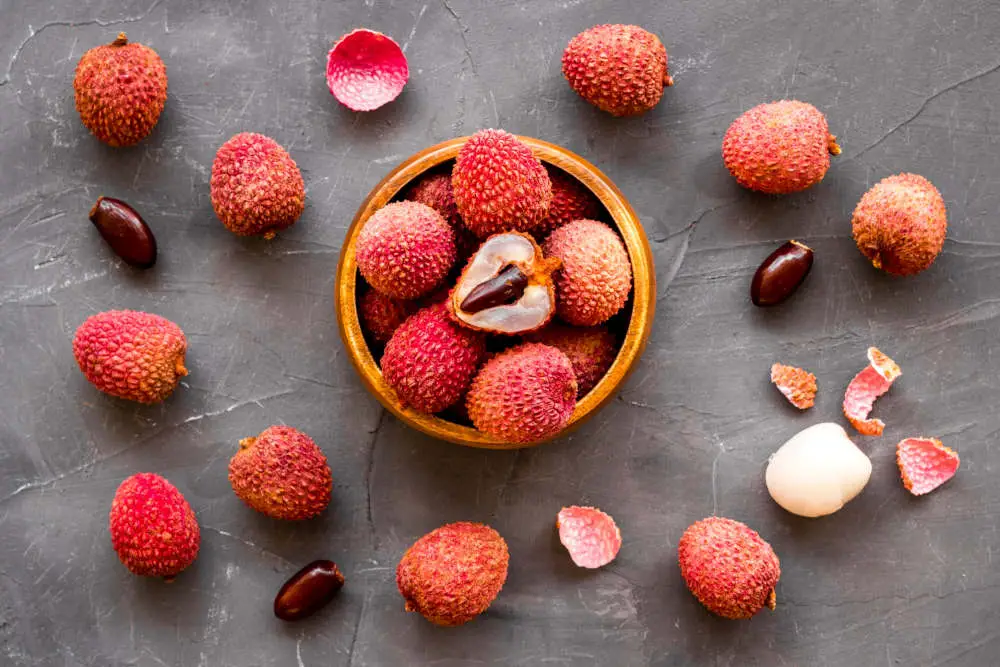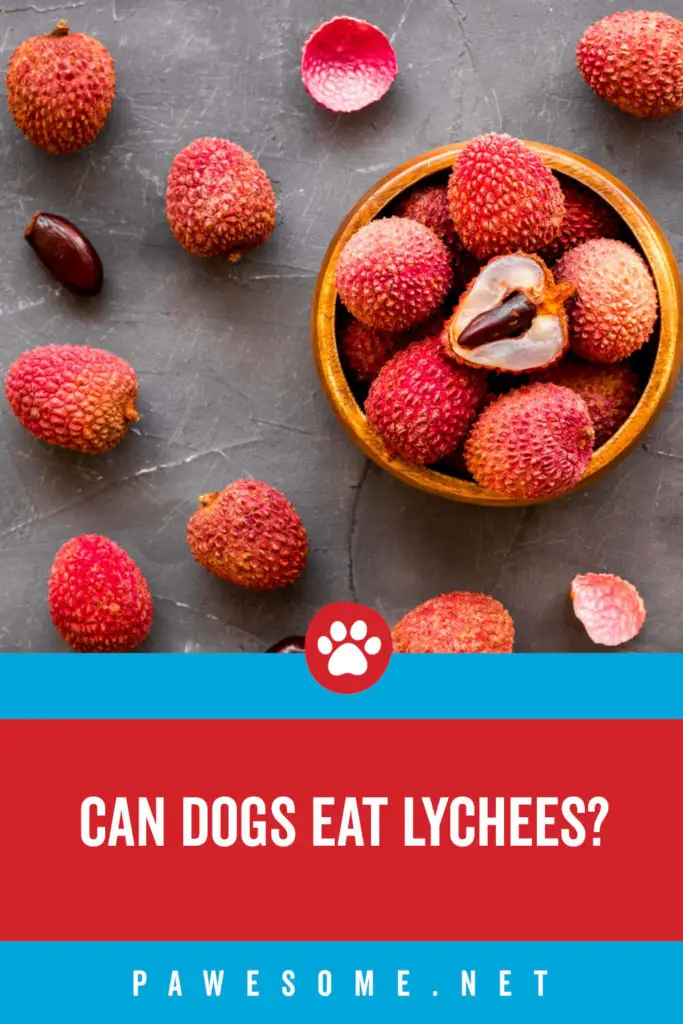
Dogs are known to be man’s best friend, and as such, their health and well-being are of utmost importance to their owners. One aspect of pet care that is often overlooked is their diet. While dogs can eat a variety of human foods, not all are safe for them. One such food that pet owners may be curious about is lychee.
Lychee is a tropical fruit that is native to China and Southeast Asia. It is a sweet and juicy fruit that is often enjoyed as a snack or used in desserts. While humans can enjoy lychee without any problems, pet owners may wonder if it is safe for their furry friends. In this article, we will explore whether dogs can eat lychee and the potential benefits and risks associated with feeding them this fruit.
What are Lychees?
Lychee is a tropical fruit that originated in China and is now grown in many parts of the world. It has a rough, reddish-pink outer skin that is inedible and needs to be peeled off to reveal the juicy, translucent white flesh inside. The fruit is small, round, and about the size of a golf ball. It has a sweet and slightly floral taste that is often described as a cross between a grape and a watermelon. It looks very similar to rambutan.
Lychees are a good source of vitamins and minerals. They are rich in vitamin C, which is an antioxidant that helps boost the immune system and promote healthy skin. They also contain potassium, which is important for maintaining a healthy heart and regulating blood pressure. In addition, lychees are a good source of fiber, which helps keep the digestive system healthy and promotes regular bowel movements.
However, lychees are also high in sugar, which can be a concern for dogs. Overeating lychees can lead to an upset stomach and diarrhea. It is important to give lychees to dogs in moderation and only as an occasional treat. It is also important to remove the pit and outer skin before feeding lychees to dogs, as these parts can be a choking hazard and difficult to digest.
Are Lychees Safe for Dogs?
Lychees are a delicious and exotic fruit that many people love to eat. But can dogs eat lychees? The answer is yes, but with some important caveats.
Benefits of Lychees for Dogs
Lychees can be a healthy treat for dogs when given in moderation. The fruit is a good source of fiber and contains beneficial vitamins and minerals such as vitamin C, calcium, phosphorus, and potassium. These nutrients can help support your dog’s overall health and well-being.
In addition, lychees contain antioxidants that can help protect your dog’s cells from damage caused by free radicals. This can help reduce the risk of certain diseases and promote a healthy immune system.
Risks of Lychees for Dogs
While lychees can be a healthy treat for dogs, they also come with some risks. The fruit contains high amounts of sugar, which can lead to an upset stomach if your dog eats too much. Additionally, the skin and seeds of the fruit are not safe for dogs to eat and can cause digestive issues or even blockages.
It’s important to make sure that any lychees you give your dog are ripe and that you remove the skin and seeds before feeding them to your pet. Unripe lychees can be toxic to dogs and cause vomiting, diarrhea, and other symptoms. If you’re unsure whether a lychee is ripe, it’s best to err on the side of caution and avoid giving it to your dog altogether.
In summary, lychees can be a healthy treat for dogs when given in moderation and prepared properly. However, it’s important to be aware of the risks and take steps to ensure that your dog stays safe and healthy.
Also Read: Can Dogs Eat Guava?
Can Dogs Eat Lychee Seeds?
Lychee seeds are not safe for dogs to eat. They are a choking hazard and can cause digestive problems. According to Hepper, lychee seeds contain saponin, which can be toxic to dogs. If your dog accidentally ingests a lychee seed, they may experience vomiting, diarrhea, and abdominal pain. In severe cases, the seed may cause an obstruction in the digestive system, which can be life-threatening.
Dogs should not eat lychee seeds. Always remove the seeds before giving your dog lychee as a treat. If your dog does accidentally ingest a seed, monitor them closely for any signs of discomfort and contact your veterinarian if necessary.
Can Dogs Eat Lychee Skin?
While the flesh of the fruit is generally safe for dogs to consume in moderation, the skin is a different story. Lychee skin can be difficult for dogs to digest, and it can pose a choking hazard. Additionally, the skin may contain traces of pesticides that can be harmful to dogs. It is best to remove the skin before giving lychee to your dog.
Can Dogs Eat Unripe Lychee?
Unripe lychee is not safe for dogs to eat, or even for people. If your dog eats unripe lychee, they can become very sick. Unripe lychee is green and it contains a toxin called hypoglycin A, which can cause hypoglycemia, seizures, vomiting, and even death in dogs.
According to The Happy Puppy Site, “the hypoglycin A in unripe lychee can cause a dog’s blood sugar levels to drop rapidly, leading to hypoglycemia. Symptoms of hypoglycemia include lethargy, vomiting, seizures, and even death.”
Therefore, it is important to always make sure that the lychee is ripe before giving it to your dog as a treat. Ripe lychee is red or pink and it is softer to the touch. If you aren’t sure whether or not a lychee is ripe, it’s best to avoid it altogether.
It’s also important to note that you should never give your dog unripe lychee skin or seeds, as they can also contain hypoglycin A and pose a choking hazard.
How to Feed Lychees to Your Dog
Preparation Tips
Before feeding lychees to your furry friend, it’s important to prepare them properly. First, remove the skin and seeds from the lychee. The skin can be tough for dogs to digest, and the seeds are toxic and can cause intestinal blockages.
Next, make sure the lychee is ripe. Unripe lychees can cause upset stomachs and may be difficult for your dog to digest.
Serving Suggestions
When serving lychees to your dog, it’s best to start with a small amount to see how they react. Lychees are high in sugar, so it’s important to feed them in moderation.
You can slice the lychees into small pieces and mix them in with your dog’s regular food, or you can give them as a treat.
It’s important to monitor your dog after feeding them lychees to ensure they don’t have an adverse reaction. If you notice any vomiting, diarrhea, or other symptoms, contact your veterinarian immediately.
Also Read: Can Dogs Eat Pomelo?
Alternatives to Lychees
While lychees may be a tasty treat for humans, it’s important to remember that dogs have different nutritional needs. If you’re looking for a healthy and safe alternative to lychees, there are plenty of options to choose from.
One great option is apples. Apples are a great source of fiber and antioxidants, and they can help to regulate blood sugar levels. Just be sure to remove the seeds and core before giving them to your dog, as these can be a choking hazard.
Papayas are another healthy treat for canines. Like similar fruits, the seeds should not be ingested. Papayas are a good source of vitamins A, C, and E, as well as potassium and fiber. They also contain an enzyme called papain, which can aid in digestion.
If you’re looking for a low-calorie treat, consider giving your dog some fresh berries. Blueberries, strawberries, and raspberries are all great options. They’re packed with antioxidants and other nutrients, and they’re also low in calories.
Other safe fruits for dogs include bananas, watermelon, and cantaloupe. Just be sure to remove any seeds or pits before giving them to your dog.
Remember, while it may be tempting to share your favorite foods with your furry friend, it’s important to choose treats that are safe and healthy for them. By sticking to dog-friendly fruits and vegetables, you can help ensure that your pup stays happy and healthy for years to come.


